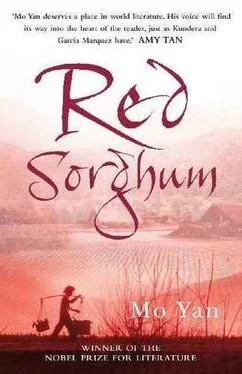During the most critical moments, Father was always slightly more alert than Granddad, perhaps because he concentrated on surface phenomena; superficial thought seems ideally suited to guerrilla fighting. At that moment, Granddad looked benumbed; his thoughts were riveted on a single point, which might have been a twisted face, or a shattered rifle, or a single spent bullet. He was blind to all other sights, deaf to all other sounds. This problem — or characteristic — of his would grow more pronounced over the coming decade. He returned to China from the mountains of Hokkaido with an unfathomable depth in his eyes, gazing at things as though he could will them to combust spontaneously.
Father never achieved this degree of philosophical depth. In 1957, after untold hardships, when he finally emerged from the burrow Mother had dug for him, his eyes had the same look as in his youth: lively, perplexed, capricious. He never did figure out the relationship between men and politics or society or war, even though he had been spun so violently on the wheel of battle. He was forever trying to squeeze the light of his nature through the chinks in his body armour.
Granddad and Father circled the site of the massacre a dozen times, until Father said tearfully, ‘Dad… I can’t walk any more….’
Granddad’s robot movements stopped; taking Father’s hand, he backed up ten paces and sat down on a patch of solid, dry earth. The cheerless and lonely sorghum field was highlighted by the crackle of fires in the village. Weak golden flames danced fitfully beneath the silvery moonlight. After sitting there for a moment, Granddad fell backward like a capsized wall, and Father laid his head on Granddad’s belly, where he fell into a hazy sleep. He could feel Granddad’s feverish hand stroking his head, which sent his thoughts back nearly a dozen years, to when he was suckling at Grandma’s breast.
He was four at the time, and growing tired of the yellowed nipple that was always thrust into his mouth. Having begun to hate its sour hardness, he gazed up into the look of rapture in Grandma’s face with a murderous glint in his eyes and bit down as hard as he could. He felt the contraction in Grandma’s breast as her body jerked backward. Trickles of a sweet liquid warmed the corners of his mouth, until Grandma gave him a swat on the bottom and pushed him away. He fell to the ground, his eyes on the drops of fresh red blood dripping from the tip of Grandma’s pendulous breast. He whimpered, but his eyes were dry. Grandma, on the other hand, was crying bitterly, her shoulders heaving, her face bathed in tears. She lashed out at him, calling him a wolf cub, as mean as his wolf of a father.
Later on he learned that that was the year Granddad, who loved Grandma dearly, had fallen in love with the hired girl, Passion, who had grown into a bright-eyed young woman. At the moment when Father bit Grandma, Granddad, who had grown tired of her jealousy, was living with Passion in a house he’d bought in a neighbouring village. Everyone said that this second grandma of mine was no economy lantern, and that Grandma was afraid of her, but this is something I’ll clear up later. Second Grandma eventually had a girl by Granddad. In 1938, Japanese soldiers murdered this young aunt of mine with a bayonet, then gang-raped Second Grandma — this, too, I’ll clear up later.
Granddad and Father were exhausted. The wound throbbed in Granddad’s arm, which seemed to be on fire. Father’s feet had swollen until his cloth shoes nearly split their seams, and he fantasised about the exquisite pleasure of airing the rotting skin of his feet in the moonlight. But he didn’t have the strength to sit up and take off his shoes. Instead, he rolled over and rested his head on Granddad’s hard stomach so he could look up into the starry night and let the moon’s rays light up his face. He could hear the murmuring flow of the Black Water River and see black clouds gather in the sky above him. He remembered Uncle Arhat’s saying once that, when the Milky Way lay horizontally across the sky, autumn rains would fall. He had only really seen autumn water once in his life.
The sorghum was ready for harvest when the Black Water River rose and burst its banks, flooding both the fields and the village. The stalks strained to keep their heads above water; rats and snakes scurried and slithered up them to escape drowning. Father had gone with Uncle Arhat to the wall, which the villagers were reinforcing, and gazed uneasily at the yellow water rushing towards him. The villagers made rafts from kindling and paddled out to the fields to hack off the ears of grain, which were already sprouting new green buds. Bundles of soaked deep-red and emerald-green ears of sorghum weighted down the rafts so much it’s a wonder they didn’t sink. The dark, gaunt men, barefoot and bare-chested, wearing conical straw hats, stood with their legs akimbo on the rafts, poling with all their strength as they rocked from side to side.
The water in the village was knee-high, covering the legs of livestock, whose waste floated on the surface. In the dying rays of the autumn sun, the water shone like liquefied metal; tips of sorghum stalks too far away to be harvested formed a canopy of golden red just above the rippling surface, over which flocks of wild geese flew. Father could see a bright, broad body of water flowing slowly through the densest patch of red sorghum, in sharp contrast to the muddy, stagnant water around him; it was, he knew, the Black Water River. On one of the rafts lay a silver-bellied, green-backed grass carp, a long, thin sorghum stalk stuck through its gills. The farmer proudly held it up to show the people on the wall; it was nearly half as tall as he was. Blood oozed from its gills, and its mouth was open as it looked at my father with dull, sorrowful eyes.
Father was thinking about how Uncle Arhat had bought a fish from a farmer once, and how Grandma had scraped the scales from its belly, then made soup out of it; just thinking about that delicious soup gave him an appetite. He sat up. ‘Dad,’ he said, ‘aren’t you hungry? I am. Can you find me something to eat? I’m starving….’
Granddad sat up and fished around in his belt until he found a bullet, which he inserted into the cylinder; then he snapped it shut, sending the bullet into the chamber. He pulled the trigger, and there was a loud crack. ‘Douguan,’ he said, ‘let’s go find your mother….’
‘No, Dad,’ Father replied in a high-pitched, frightened voice, ‘Mother’s dead. But we’re still alive, and I’m hungry. Let’s get something to eat.’
Father pulled Granddad to his feet. ‘Where?’ Granddad mumbled. ‘Where can we go?’ So Father led him by the hand into the sorghum field, where they walked in a crooked line, as though their objective was the moon, hanging high and icy in the sky.
A growl emerged from the field of corpses. Granddad and Father stopped in their tracks and turned to see a dozen pairs of green eyes, like will-o’-the-wisps, and several indigo shadows tumbling on the ground. Granddad took out his pistol and fired at two of the green eyes; the howl of a dying dog accompanied the extinguishing of those eyes. Granddad fired seven shots in all, and several wounded dogs writhed in agony among the corpses. While he was emptying his pistol into the pack, the uninjured dogs fled into the sorghum field, out of range, where they howled furiously at the two humans.
The last couple of bullets from Granddad’s pistol had travelled only thirty paces or so before thudding to the ground. Father watched them tumble in the moonlight, so slowly he could have reached out and caught them. And the once crisp crack of the pistol sounded more like the phlegmatic cough of a doddering old man. A tortured, sympathetic expression spread across Granddad’s face as he looked down at the weapon in his hand.
Читать дальше












